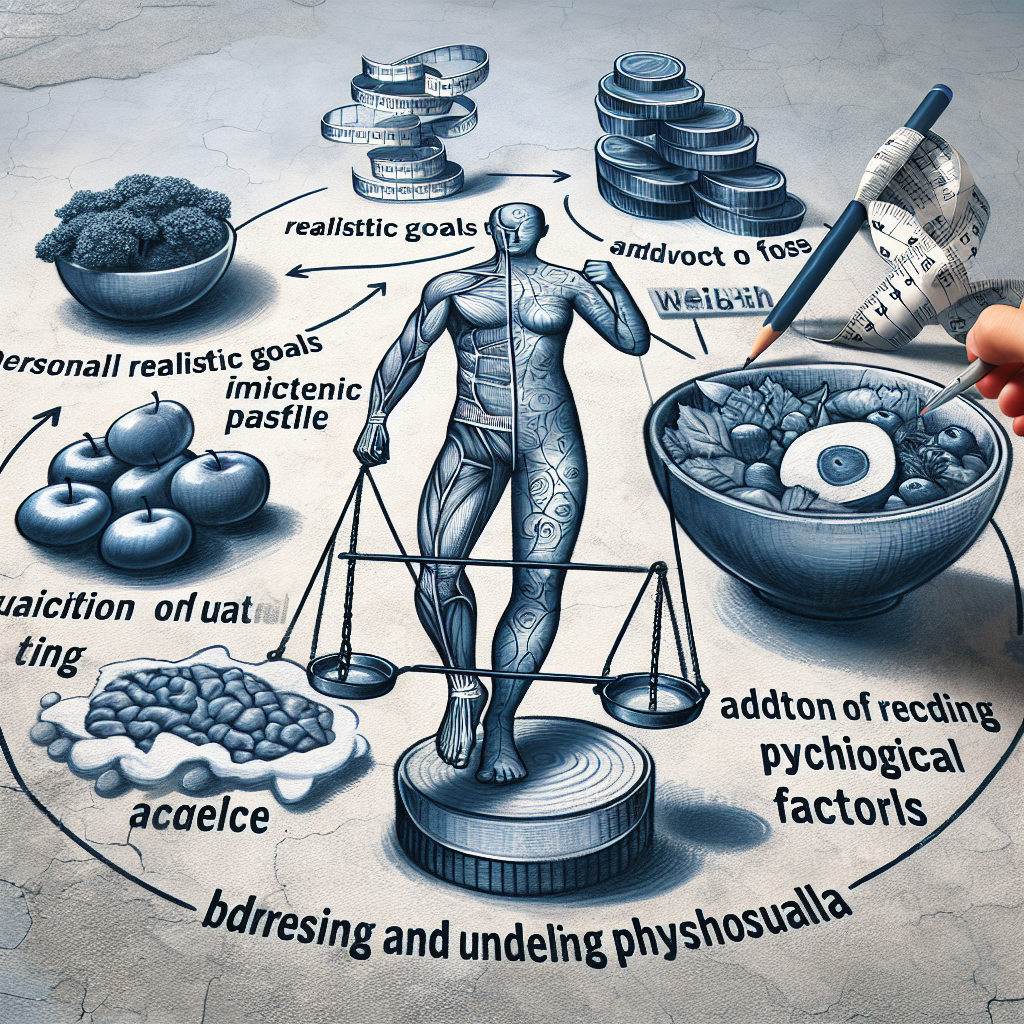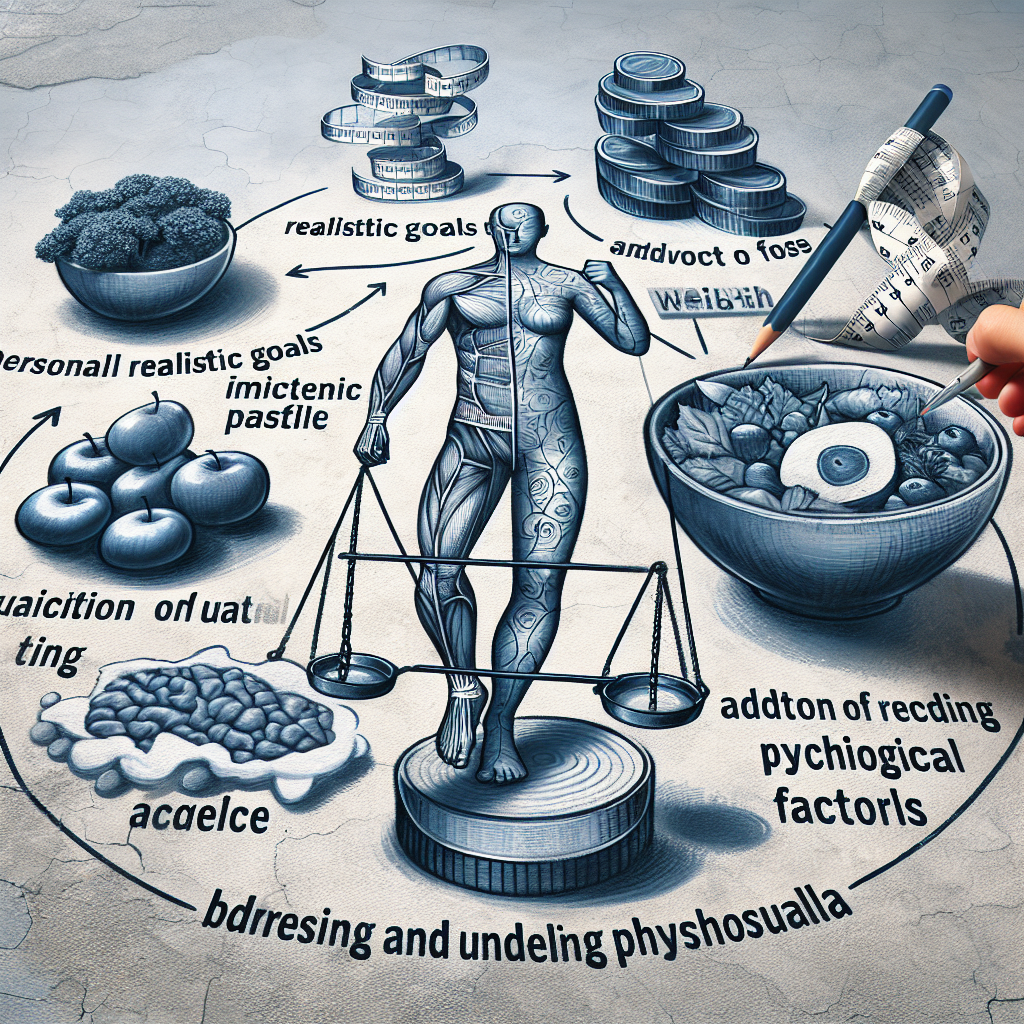Losing weight can sometimes feel like an overwhelming task, but it doesn’t have to be. In this article, we will explore what a healthy approach to weight loss entails. By focusing on sustainable changes, listening to your body, and incorporating both nutrition and exercise, you can achieve your weight loss goals in a way that promotes overall well-being and long-term success. So, if you’re ready to embark on a journey to a healthier you, let’s dive into the world of healthy weight loss together!
Understanding Weight Loss
What is weight loss?
Weight loss refers to the process of reducing the amount of body weight, be it fat, muscle, or water. It is achieved by creating a calorie deficit, which means consuming fewer calories than you burn. Weight loss can help improve overall health and well-being and is often desired for cosmetic or health reasons.
Why is weight loss important?
Weight loss is important for several reasons. Firstly, excess weight can increase the risk of various health conditions such as heart disease, diabetes, and certain cancers. Losing weight can significantly reduce these risks and improve overall health. Additionally, weight loss can boost self-confidence, increase energy levels, improve sleep quality, and enhance mobility and quality of life.
Different approaches to weight loss
There are various approaches to weight loss, and what works for one person may not work for another. Some popular methods include dietary changes, increased physical activity, behavior modification techniques, and sometimes, medical interventions. It is important to find an approach that suits your lifestyle, preferences, and goals in order to achieve long-term success.
Setting Realistic Goals
What are realistic weight loss goals?
Realistic weight loss goals are those that are achievable and sustainable in the long run. While the rate at which you lose weight may vary, a healthy and reasonable goal is to aim for a slow and steady weight loss of 1-2 pounds per week. This allows your body to adjust gradually and reduces the risk of rebound weight gain.
Importance of setting achievable goals
Setting achievable goals is crucial in weight loss journey. When you set unrealistic goals, such as aiming to lose a large amount of weight in a short period of time, it can often lead to frustration and disappointment if those goals are not met. On the other hand, setting achievable goals allows you to celebrate small victories along the way, boosting motivation and increasing your chances of long-term success.
Tips for setting realistic goals
To set realistic goals, it is important to consider your specific circumstances and consult with a healthcare professional. Start by determining your ideal weight range based on factors such as height, body composition, and overall health. Break your overall weight loss goal into smaller milestones, making it easier to track progress. Additionally, focus on non-scale-related goals such as improving fitness levels, increasing energy, or reducing clothing sizes, as they provide a more holistic measure of success.

Health and Nutrition
Importance of a balanced diet
A balanced diet is essential for both weight loss and overall health. It provides the necessary nutrients to support bodily functions, maintain muscle mass, and promote optimal well-being. A balanced diet includes a variety of foods such as fruits, vegetables, whole grains, lean proteins, and healthy fats. It is important to avoid extreme restriction or elimination of entire food groups, as this can lead to nutrient deficiencies and imbalances.
Choosing nutrient-dense foods
When aiming for weight loss, it is crucial to choose nutrient-dense foods. These are foods that provide a high amount of nutrients relative to their calorie content. Examples of nutrient-dense foods include fruits, vegetables, lean proteins, whole grains, and low-fat dairy products. These foods not only provide essential vitamins and minerals but also help keep you feeling satisfied and full for longer, reducing the risk of overeating.
Understanding portion control
Portion control plays a key role in weight loss. It involves eating appropriate amounts of food to meet your nutritional needs without exceeding your calorie intake. Using smaller plates, measuring servings, and being mindful of portion sizes can help you manage your intake. It is important to pay attention to hunger and fullness cues, eating until you are satisfied rather than stuffed.
Healthy meal planning and preparation
Meal planning and preparation can greatly support weight loss goals. By planning your meals in advance, you can ensure that you have nutritious options readily available, reducing the chances of making impulsive unhealthy food choices. Additionally, preparing meals at home allows you to have control over the ingredients, portion sizes, and cooking methods, making it easier to make healthier choices.
Physical Activity
Role of exercise in weight loss
Exercise plays a crucial role in weight loss. It helps burn calories, build muscle, and increase metabolism. Engaging in regular physical activity also provides numerous health benefits, such as reducing the risk of chronic diseases, improving cardiovascular health, and enhancing mood and mental well-being. Exercise is an essential component of any weight loss plan and should be tailored to individual preferences and fitness levels.
Choosing the right types of physical activity
When incorporating exercise into your weight loss journey, it is important to choose activities that you enjoy and can sustain in the long term. Whether it’s walking, jogging, swimming, cycling, dancing, or participating in group fitness classes, the key is to find activities that you find enjoyable and that fit into your schedule. This will not only increase adherence but also make it more likely that you will continue with regular physical activity even after reaching your weight loss goals.
Creating an exercise routine
Creating an exercise routine can provide structure and consistency to your weight loss efforts. Aim for a combination of cardiovascular exercise, strength training, and flexibility exercises. Start gradually and increase intensity and duration over time. It is important to listen to your body, rest when needed, and consult with a certified personal trainer if you need guidance or support.
Incorporating physical activity into daily life
In addition to structured exercise sessions, finding ways to incorporate physical activity into your daily life is important for long-term success. This can include taking the stairs instead of the elevator, walking or biking for transportation, parking farther away from your destination, or incorporating physical activity breaks during the workday. These small changes can add up and make a significant difference in your overall calorie expenditure.

Behavioral Changes
Identifying unhealthy habits
In order to achieve sustainable weight loss, it is important to identify and address unhealthy habits that may be contributing to weight gain or hindering your progress. This may include behaviors such as emotional eating, eating in response to stress, poor portion control, or a sedentary lifestyle. Take time to reflect on your habits and patterns, and identify areas where you can make positive changes.
Strategies for changing behavior
Changing behavior can be challenging, but with the right strategies, it is possible to develop healthier habits. Start by setting specific and realistic goals, and break them down into manageable steps. Replace unhealthy habits with healthier alternatives, such as seeking out support from friends or engaging in stress-relieving activities instead of turning to food. It is important to be patient and kind to yourself throughout this process, as behavior change takes time and effort.
Building a support system
Having a strong support system can greatly enhance your weight loss journey. Surround yourself with people who are supportive of your goals and will encourage you to make healthy choices. This can be family, friends, or even online communities focused on weight loss or healthy living. Sharing your challenges, progress, and successes with others can provide accountability, motivation, and a sense of belonging.
Coping with stress and emotional eating
Stress and emotions can often trigger unhealthy eating habits, leading to setbacks in weight loss efforts. It is important to develop alternative coping mechanisms for dealing with stress and emotions. This may include engaging in physical activity, practicing relaxation techniques, seeking social support, or engaging in creative outlets. Finding healthy ways to manage stress can greatly contribute to your overall well-being and weight loss success.
Monitoring Progress
Tracking weight loss
Tracking your weight loss progress is an effective way to stay motivated and monitor your success. This can be done by regularly weighing yourself, keeping a weight loss journal, or using various tracking apps or devices. However, it is important to remember that weight is just one aspect of your overall health, and other indicators should also be considered.
Measuring other indicators of health
While weight is often used as a measure of progress, it is not the only indicator of health. Other measures such as body measurements, body fat percentage, energy levels, strength, and endurance can provide a more comprehensive picture of your overall progress. Celebrate non-scale victories, such as fitting into smaller clothes or having increased energy and confidence.
Importance of regular check-ins
Regular check-ins with yourself or a healthcare professional are important throughout your weight loss journey. This allows you to assess your progress, reevaluate goals if necessary, and make adjustments to your plan. It is helpful to schedule periodic appointments or assessments to monitor your health and weight loss progress, ensuring that you are on the right track.
Celebrating milestones
When working towards weight loss goals, it is important to celebrate milestones along the way. Whether it’s reaching a certain weight, completing a fitness challenge, or achieving a non-scale victory, take the time to acknowledge and reward your hard work. Celebrating milestones helps to maintain motivation and reinforces positive behaviors, making it more likely that you will continue to pursue your weight loss journey.
Avoiding Fad Diets
Understanding fad diets
Fad diets are popular, often short-term, weight loss plans that promise quick results by severely restricting certain food groups or promoting specific foods or supplements. These diets often have catchy names and extravagant claims, but they lack scientific evidence to support their effectiveness and long-term sustainability.
Potential dangers and risks
Fad diets can be dangerous and potentially harmful to your health. They often promote extreme calorie restriction, eliminate entire food groups, or rely on potentially unsafe supplements. This can lead to nutrient deficiencies, inadequate energy intake, and other health complications. Fad diets can also result in a cycle of weight loss and regain, which can be damaging to both physical and psychological health.
Why fad diets are not sustainable
Fad diets are not sustainable in the long term because they often involve drastic and unrealistic changes to eating habits. These diets are challenging to maintain for extended periods and can lead to feelings of deprivation, frustration, and guilt. Additionally, they do not address the underlying behaviors and habits that contribute to weight gain, making it more likely that weight will be regained once the diet is discontinued.
Seeking Professional Guidance
Importance of consulting a healthcare professional
Before embarking on a weight loss journey, it is important to consult with a healthcare professional. They can assess your overall health, provide personalized guidance, and help you determine the most appropriate and safe approach to weight loss based on your individual needs and goals. They can also monitor your progress and provide support throughout the process.
Working with a registered dietitian or nutritionist
A registered dietitian or nutritionist can play a crucial role in guiding your weight loss journey. They are trained professionals who can provide evidence-based dietary advice, help you develop a personalized meal plan, and offer ongoing support and accountability. Working with a professional can ensure that you are receiving accurate and reliable information and can greatly enhance your chances of long-term success.
Guidance from certified personal trainers
Incorporating physical activity into your weight loss plan can be optimized with the guidance of a certified personal trainer. They can assess your fitness level, help you develop a safe and effective exercise routine, and provide motivation and support. Personal trainers can ensure that you are using proper form and technique, reducing the risk of injury and maximizing the benefits of your workouts.
Support and Accountability
Importance of having a support system
Having a support system is crucial for successful weight loss. Surrounding yourself with people who share your goals and provide encouragement can significantly increase your chances of success. Your support system can include friends, family members, colleagues, or even online communities focused on weight loss. They can offer advice, cheer you on, and provide accountability.
Finding a weight loss accountability partner
An accountability partner can be a valuable asset in your weight loss journey. This can be a friend, family member, or coworker who shares your goals and is committed to achieving them together. Having someone to share your challenges, successes, and progress with can provide motivation and keep you on track. You can hold each other accountable, support each other through setbacks, and celebrate victories together.
Joining weight loss support groups
Weight loss support groups, whether in-person or online, can provide a sense of community and understanding. These groups offer a platform to share experiences, gain knowledge, and receive support from individuals who are on a similar journey. Being a part of a support group can provide motivation, offer new strategies for overcoming challenges, and help you realize that you are not alone in your weight loss efforts.
Maintaining Weight Loss
Strategies for long-term weight maintenance
Maintaining weight loss can be challenging but achievable with the right strategies. Focus on adopting healthy habits and maintaining a balanced lifestyle rather than resorting to restrictive diets or extreme measures. This includes continuing to make nutritious food choices, practicing portion control, engaging in regular physical activity, managing stress, getting adequate sleep, and seeking ongoing support when needed.
Building healthy habits
Building healthy habits is essential for maintaining weight loss in the long term. This involves making sustainable changes to your lifestyle that promote a healthy relationship with food, exercise, and overall well-being. Consider incorporating habits such as meal planning, regular physical activity, stress management techniques, and mindful eating into your daily routine. It is important to remember that small, consistent changes over time can lead to lasting results.
Establishing a balanced lifestyle
Establishing a balanced lifestyle is key to maintaining weight loss. This includes finding a healthy equilibrium between nutrition, physical activity, work, relationships, and self-care. Prioritize self-care activities that bring you joy and help manage stress. Incorporate a variety of nutritious foods into your diet and allow yourself occasional indulgences without guilt. Aim for regular physical activity that you enjoy, and make it a part of your daily routine. Striving for balance, rather than perfection, will contribute to long-term success.
In conclusion, understanding weight loss involves recognizing the importance of setting realistic goals, adopting a healthy approach to nutrition and physical activity, making behavioral changes, monitoring progress, avoiding fad diets, seeking professional guidance, and finding support and accountability. By following a comprehensive plan that includes these components, you can achieve your weight loss goals and successfully maintain a healthy lifestyle. Remember to be patient, kind to yourself, and celebrate your milestones along the way as you embark on this transformative journey.
